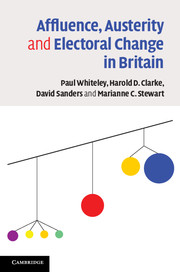Book contents
- Frontmatter
- Contents
- List of Figures
- List of Tables
- Acknowledgments
- 1 The politics of affluence and austerity
- 2 Tony's politics
- 3 Gordon's politics
- 4 ‘I agree with Nick’
- 5 Making political choices
- 6 Bearish Britain
- 7 Choosing how to choose
- 8 Performance politics and subjective well-being
- 9 Valence politics, austerity policies and electoral prospects
- Appendix A Design of the 2010 British election study
- Appendix B Measurement
- Notes
- Bibliography
- Index
8 - Performance politics and subjective well-being
Published online by Cambridge University Press: 05 June 2014
- Frontmatter
- Contents
- List of Figures
- List of Tables
- Acknowledgments
- 1 The politics of affluence and austerity
- 2 Tony's politics
- 3 Gordon's politics
- 4 ‘I agree with Nick’
- 5 Making political choices
- 6 Bearish Britain
- 7 Choosing how to choose
- 8 Performance politics and subjective well-being
- 9 Valence politics, austerity policies and electoral prospects
- Appendix A Design of the 2010 British election study
- Appendix B Measurement
- Notes
- Bibliography
- Index
Summary
Public reactions to policy delivery are central to the valence model of electoral choice. Governments that succeed in delivering cherished public goods such as economic prosperity, low crime rates, effective health care and efficient public services can anticipate electoral success. In contrast, governments that fail to deliver satisfactory quantities of these goods can expect negative reactions from disgruntled electorates. Mechanisms linking policy performance with party support are generally left implicit in the valence model, since the assumption is that good performance automatically generates positive reactions from performance-oriented voters. However, it is an interesting question why people should behave in this way. The aim of this chapter is to examine this linkage, advancing the argument that successful policy delivery increases happiness or subjective well-being and failed policies have the opposite effect.
At the outset, it bears emphasis that the importance of subjective well-being is not restricted to the valence model of voting; rather, it also highly relevant for Downsian spatial models of party competition. Like their valence rivals, spatial models assume that voters are motivated by a desire to maximize utility. However, in spatial models well-being will be enhanced by the government implementing policies on position issues that divide electorates. Position issues animate both elite and mass political behaviour, and governments aim to deliver policies that some voters favour and others oppose. If the division of preferences on a particular policy is very close, large minorities of voters will not experience an increase, and may well experience a decrease in subjective well-being. In a ‘spatial world’ of fixed voter preferences and strategic politicians, there is no guarantee that government policy implementation will yield aggregate increases in life satisfaction. Minorities with intense preferences may be sorely disappointed with government policies and suffer sizable decreases in their sense of well-being.
- Type
- Chapter
- Information
- Affluence, Austerity and Electoral Change in Britain , pp. 230 - 251Publisher: Cambridge University PressPrint publication year: 2013



